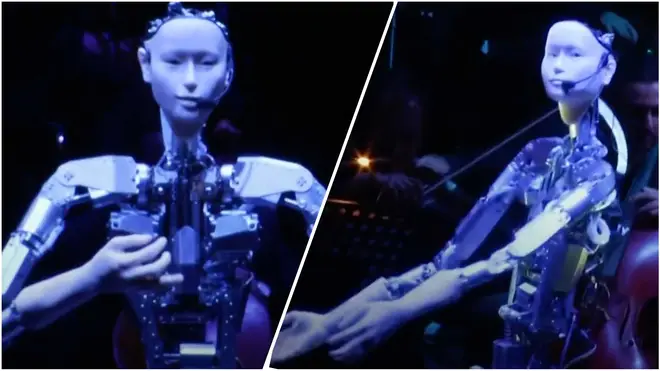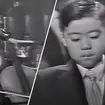Giant humanoid robot conducts human orchestra in mildly disturbing footage
25 February 2020, 14:47 | Updated: 26 February 2020, 08:56

An humanoid robot just conducted a real-life human orchestra in Japan, and now we might need to sleep with the light on...
A robot has been filmed conducting a human orchestra, raising the question: can robots really replace conductors?
In the video (watch below), we see the humanoid figure conducting and singing with a human orchestra with frightening precision.
Swinging around on a pedestal, the ‘Android Alter 3’ robot waves its arms around and gestures to rows of seated musicians, just like a real living maestro.
Rather fittingly, the name of the opera it is conducting is Scary Beauty, written by Japanese composer Keiichiro Shibuya. While Shibuya wrote the music, Alter 3 controls the volume and tempo of the music.
Read more: ‘World’s strongest’ hand plays piano with human-like fingers >
Robot Conductor Leads Human OrchestraWatch this robot conduct a human orchestra
Posted by NowThis on Wednesday, 19 February 2020
Can a robot replace a human conductor?
Well, the people in the Facebook comments section don’t seem to think so...
One user writes: “This is ridiculous!!! A human being transfers energy and emotion to the orchestra and feels it back to adjust to. A robot can’t do this! ARGH! a robot can’t take the place of an artist.”
It’s an interesting argument, though. The great US maestro Leonard Bernstein once said: “If I don’t become Brahms or Tchaikovsky or Stravinsky when I’m conducting their works, then it won’t be a great performance.”
Bernstein also worked to the idea that to conduct a great symphony, you can study a score all you like but when the performance comes, you need to throw all that away and “just feel”.
Robots like Alter 3 will, presumably, struggle to completely fulfil the human ability to “feel”.
Kotobuki Hikaru, an android technician at Reuters, said that while machines like robots are increasing in our everyday lives, it’s up to us to decide how AI (artificial intelligence) can add to our experiences.
He added: “This work is a metaphor for the relations of human and technology. Sometimes, Android will get crazy, human orchestra have to stray follow. But sometimes, people can cooperate very comfortable.”
Explaining how the robot works, Hikaru said: “The premise is that the android itself is moving according to its own will. As a structural program, the structural elements of the score which Mr. Shibuya has created is inserted into the independent and autonomous actions.
“The android reinterprets this score and incorporates it into its actions.”
The performance took place in the United Arab Emirates on 31 January.



































